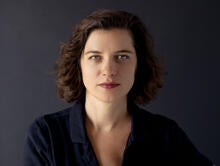Ivy Pochoda, author and visiting assistant professor with UCR’s Palm Desert Low-Residency MFA program, is a finalist for the LA Times Book Prize.
Pochoda is one of five finalists in the mystery/thriller category for her sixth novel, “Sing Her Down.” Winners will be announced at USC’s Bovard Auditorium during the 44th annual awards on April 19, the eve of the annual Los Angeles Times Festival of Books.
“I'm so thrilled to be nominated for the LA Times Book Prize (again!),” said Pochoda, whose 2020 novel, “These Women,” made it to The New York Times best thriller list. “Being a Los Angeles author, this prize is rather meaningful. And I'm so honored that the judges recognized my difficult book about difficult women.”
A New York Times book review of “Sing Her Down” explains the violence created by two female characters, Florence “Florida” Baum and Diana Diosmary “Dios” Sandoval. Released from an overpopulated Arizona prison, the two leave a string of grisly scenes in their wake as they migrate to Los Angeles.
“Why is Florida selected for early release? ‘Background, ease of reintegration,’ an officer says, i.e., she grew up in a Los Angeles mansion with a six-car garage. Dios is a ‘scholarship girl from Queens,’ released because her crime, a single assault, suggests that she doesn’t pose a significant threat to society,” the New York Times review explains.
But the “ideal” candidate for release profile is nothing but a cover for the true crimes these women commit as their stories unfold.
The New York Times continues, “Where does a woman’s violence begin? Is it a response to the violations of men, empowering, equalizing? Or are some women simply born with a need — ‘as essential as breathing’ — to inflict pain? The novel’s narrators (Kace, Dios, Florida, Lobos) all grapple with these questions as they try to reconcile their complicated histories with their own natures and limits.”
